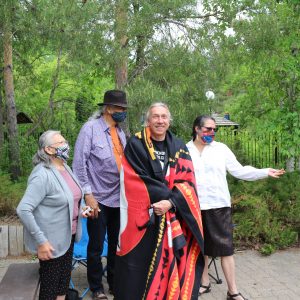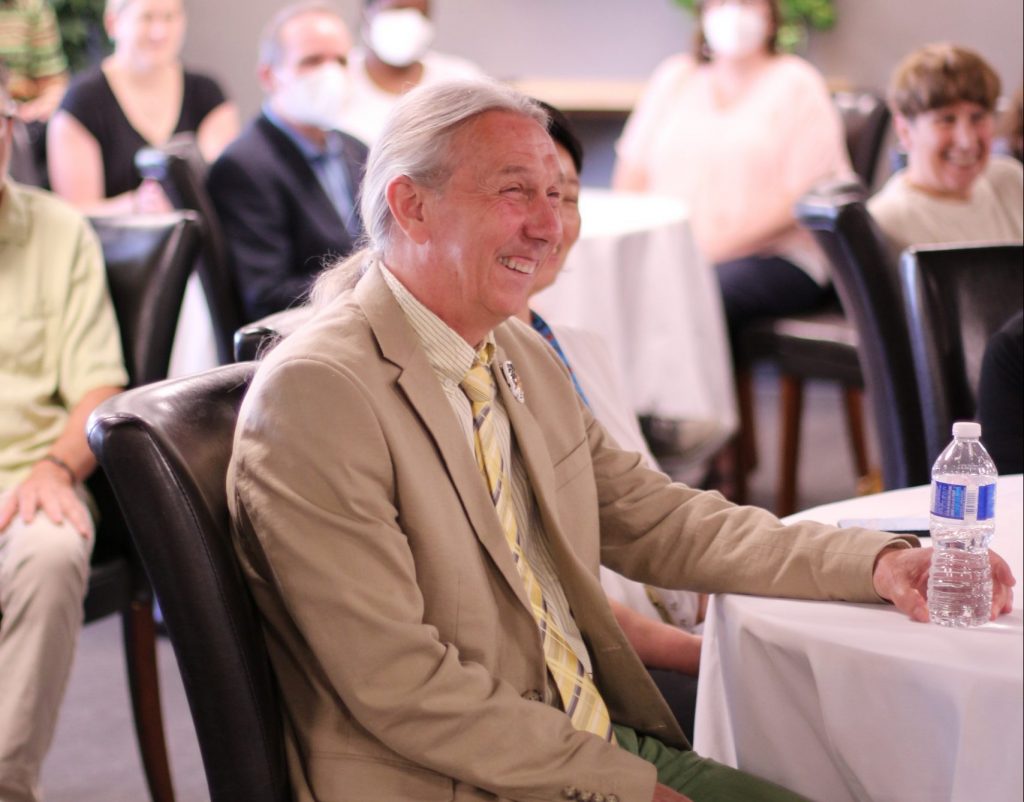
“The last thing in the world I was ever going to do was become a teacher!” says Dr. Patrick Lewis, who ended up teaching 17 years in elementary school and another 18 years in preservice and in-service teacher education.
While he was a child, Patrick really enjoyed school until Grade 7, when he suddenly didn’t find school that engaging or much fun anymore. In fact, he ended up leaving high school early. But, fast-forward to 1985, and he and his partner Karen had a new little baby girl. “We were living in family housing at UBC, and I was starting graduate work in history for my master’s. I was realizing that I needed to do something more to support my family than fiddle away at graduate research and history, so I went across campus to the Faculty of Education and spoke to an associate dean there.”
Initially, Patrick intended to enroll in the secondary teacher education program because his undergrad degree was in political science and history, but because the associate dean encouraged him to take the elementary program, he made the switch, which turned out well: “The more time I spent in K-3, the more fun I was having. I got quite engaged and comfortable with learning alongside little people. Even during practicums, I saw the enormous growth that could happen with kids that age. So that really intrigued me and I stuck with it.”
After finishing his post-graduate certificate, Patrick was hired at Pender Island School. After teaching for 5 or 6 years, he began to realize that he needed a greater understanding of how to work with kids who struggle, so he returned to university to do his master’s degree. “I thought, ‘There has to be something I’m missing.’ I was working with young children and trying to figure out how to help kids who were struggling with mostly literacy and, to a lesser extent, numeracy skills,” he says.
His master’s research did give Patrick answers, but not the answers he initially expected: “I had an unconscious sense of this, but I developed a conscious sense of the importance of building relationships with learners. So it wasn’t so much about finding new mechanisms for literacy, for teaching and learning, but it was more about kids and the relationships,” says Patrick. In retrospect, Patrick recognizes that what he learned then about building relationships as a way to help struggling kids learn, was about dealing with trauma or complex trauma, something he and his spouse Karen Wallace have been exploring and writing about more recently.
After 10 years on Pender Island, Patrick and Karen decided it was time to pack up and travel. Patrick wanted to do more graduate work around narrative inquiry and storytelling and he was accepted to the University of Queensland in 1997. They sold their acreage and the family of four backpacked through the South Pacific and ended up in Brisbane, Australia where Patrick began his PhD. Having to leave Australia before he finished his studies, Patrick returned to Victoria, BC, to finish his PhD remotely. His dissertation was a narrative inquiry called “Looking for a Good Teacher.” Patrick says, “That’s pretty much what I’ve been doing since I started teaching—looking for a good teacher.”
In 2004, the University of Regina hired Patrick as an assistant professor in early childhood education. At the beginning, the position was a ‘test drive’ with Patrick living in Regina while Karen stayed in Victoria to allow their son to finish high school and to continue with her established counselling and art therapy practice. However, in 2007, they made the decision to move to Regina, committing to stay for 5 years. “Five years turned into 18 years (and 14 for Karen),” says Patrick.
Over his time here, Patrick saw the work of the Faculty evolving: “We went through program renewal and through processes of developing mission statements and visions, and our core belief. I got the impression even from the early days that we were moving toward equity, diversity, and inclusion. But, it didn’t always go smoothly.”
Though not naturally drawn to administrative roles, Patrick adopted several leadership roles along the way, such as early childhood education subject chair, co-organizer of the “talkin’ about schools and society” discussion series, Education Indigenous Advisory Circle co-chair, elementary program chair, and the associate dean of faculty development and human resources.
Patrick’s hope in taking on these responsibilities was always that “it would be an opportunity to make programming a more holistic experience for our preservice teachers in preparing them for the children they were going to work alongside in their classrooms. I wanted to open their eyes to the importance of diversity and inclusion, and to become aware of historical oppression, with Indigenous people, Black people, and so-called people of colour.”
The Play, Art, Narrative (PAN) summer institutes that Patrick and Karen taught for many years were also intended to open students’ eyes to the structural and systemic racism in educational practices, in what teachers do. “If I’m to believe the feedback from students, it changed a lot of teacher’s ideas and ways of thinking about teaching, so that was, I think, pretty good work,” says Patrick.
The work we do is “hugely significant,” says Patrick. “Our students will be with kids about 197 days of the year for almost 6 hours per day. It is vitally important that we not only prepare students for this incredibly sensitive and important work, but also that we help them understand the realities of school life, and help them to look beyond the students in front of them to see the lives of those students and understand the importance of developing relationships with them and their families. The importance of this work behooves us to make sure we are doing all we can to help our preservice and in-service teachers become empathetic, authentic, and good listeners.”
Patrick’s advice for the Faculty mirrors what he learned in his search for a good teacher: “Build relationships with people and listen to people—really, really listen to people so they know you heard them. It’s not about whether you agree with them or not. Let them know you heard them and that you understand how they are feeling or thinking about a situation.”
After retiring at the end of June 2022, Patrick says, “I had a very privileged and charmed life. I was really lucky to work with great faculty and support staff. I loved it there. I found everything that the Faculty was doing intriguing. I worked alongside six deans while I was there. In my travels through the committees and programs I was involved with, faculty engagement was really refreshing and hopeful.”
Affirmation of a job well done came in the form of the International Play Association’s Right to Play award which honoured Patrick in October for his career-long advocacy and service promoting the child’s right to play. A former student of Patrick’s, Whitney Blaisdell, who nominated him for the award, says, “Many may agree—this honour is very well-deserved.”
Follow us on social media